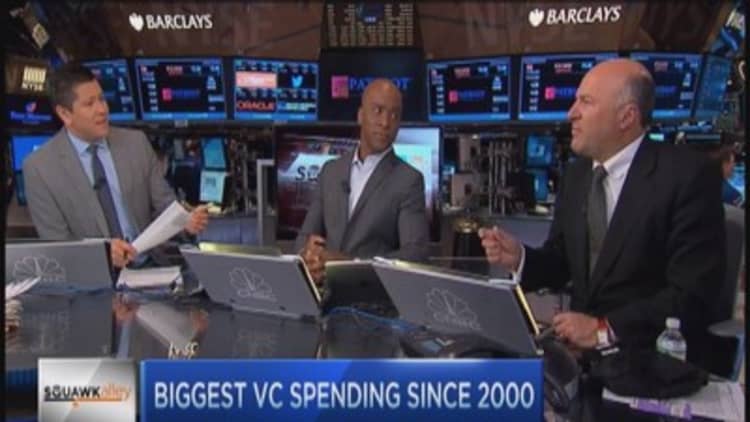Goldman Sachs programmers have become big fans of open source technology from software developer Docker. So much so that the investment bank invested in the start-up at a valuation of about $1 billion.
Docker, whose software lets developers easily move apps from laptop to server and into the cloud, said Tuesday that it raised $95 million in its fourth round of funding. Insight Venture Partners led the financing and was joined by Goldman Sachs, Coatue, Northern Trust and a group of existing investors.
Since launching its free open source product in 2013, Docker has exploded onto the scene. Its so-called container technology—think big shipping container—makes it simple for developers to take an app from creation to test to production without dropping code or picking up bugs along the way.
Read MoreDocker's rise from sleeper to open source king
The product has been downloaded more than 300 million times, and its commercial offering, introduced in June, is being used by about 10,000 groups.
Start-up investing is nothing new to Goldman Sachs. The firm backed 63 such companies from the beginning of 2009 to early last year, including Dropbox, Spotify and Uber, according to CB Insights.
With Docker, it was the bank's information technology department that saw the value first because of its widespread adoption internally.
Venture capital's generous year

"In case of both Goldman Sachs and Northern Trust and others expressing interest that were banks, the interest originated in their I.T. organizations," said Ben Golub, Docker's chief executive officer. "It was what all their colleagues at other banks were talking about. They informed their investments wing."
Goldman Sachs doesn't often talk publicly about the technology it's using internally, but Don Duet, a 27-year veteran of the firm and and global co-head of its technology division, went so far as to tout Docker's software in Tuesday's press release.
"When our engineers discovered and started using Docker's open source platform, they were immediately impressed by the portability it provides applications," Duet said. "It inspired us to move towards a standardized infrastructure for packaging, shipping and running our applications based on Docker's technology."
The statement didn't disclose Docker's valuation and Golub declined to comment on it, but sources familiar with the deal said it was in the neighborhood of $1 billion.
As popular as Docker has become, there's plenty of work to do to turn it into a successful business. The company didn't have a paid offering for enterprises until December. That product, featuring greater security, support, management tools and an on-premise option, is being tested by 15 customers and is expected to be made generally available this quarter.
Read MoreHadoop goes primetime with Hortonworks IPO
Docker has the open source challenge of proving that it's worth paying big money for a service and support suite when the core technology is free.
Investors are betting the company will do it, and supplying plenty of capital to increase the odds. Prior to this round, Docker had raised about $65 million from investors including Benchmark, Trinity Ventures, Greylock Partners and Sequoia Capital, and was valued in September at about $400 million.
Docker has tripled its number of employees from a year ago to 120 today. Golub said the focus has been on product development, but in the second half of the year that will turn to hiring people in sales and support.
Read MoreMicrosoft's aim to catch Amazon in the cloud
One area where Docker doesn't have to spend much is on marketing. The company has partnered with all of the biggest cloud providers—Amazon Web Services, Microsoft, Google and IBM—which have publicly announced their support of Docker.
A bigger boon is the enthusiasm of the developer community. There are now more than 200 meet-up groups around the world hosting events, with many attracting hundreds of people, Golub said.
"We let users know when they're happening," Golub said. "And occasionally send over a pack of stickers."


